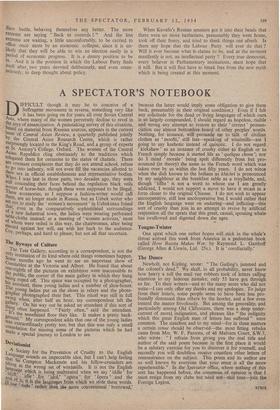A Society for the Prevention of Cruelty to the English
Language sounds an impeccable idea, but I can't help feeling that Sir Compton Mackenzie and his fellow-crusaders are Lilting at the wrong set of windmills. It is not the English :",guage which is being maltreated when we say iddle ' for '. idle ' for idol," opera' for ' Opera ' and the St of it it is the lauguag,es from which we stole these words. It -use &stole ' rather than the more conventional borrowed,' because the latter would imply some obligation to give them back, presumably in their original condition.) Even if I felt any solicitude for the dead or living languages of which ours is so largely compounded, I should regard as hopeless, risible • and wrong any attempt to restore to their 'correct' pronun- ciation our almost bottomless hoard of other peoples' words. Nothing, for instance, will persuade me to talk of civilian clothes as moofti; still less—speaking of windmills—am I going to say keehotic instead of quixotic. I do not regard kickshaw ' as an instance of cruelty either to English or to French simply because it started life as quelque chose '; nor do I mind 'morale' being spelt differently from but pro- nounced (in theory) the same as the French word which was taken over by us within the last fifty years. I do not wince when the dish known to the Indians as khichri is pronounced by my neighbour at the breakfast table as a trisyllable, and, though tiffin ' is not a word to whose use I am greatly addicted, I would not support a move to have it recast in a form closer to the original Chinese. I do not wish to appear uncooperative, still less uncooperative but I would rather that the English language went on enduring—and inflicting—this sort of cruelty than join in an attempt to revive by artificial respiration all the sprats that this great, casual, spouting whale has swallowed and digested down the ages.


































 Previous page
Previous page